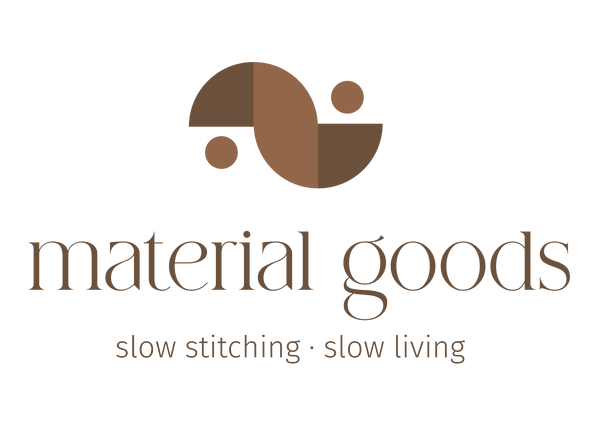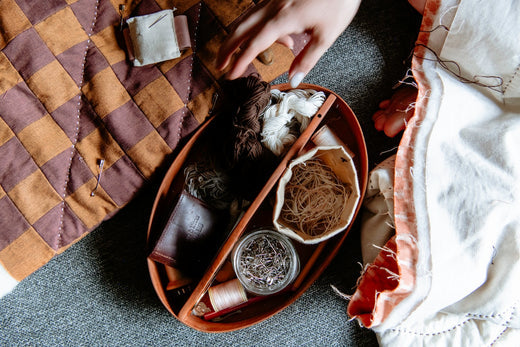If you've recently discovered the joy of sewing, you're probably eager to dive into this wonderful world of creativity. However, before you start stitching away, it's essential to equip yourself with the right tools. Having the proper sewing tools not only makes the process more enjoyable but also ensures your projects turn out beautifully. Here are 5 essential sewing tools every beginner should have in their toolkit.
1. Needles & Thread
Needles and thread come in many types, but having a simple set of each can be your the all-purpose workhorses of your sewing studio. While you may do most of your sewing by machine, you'll undoubtedly find yourself hand sewing from time to time, so it's nice to have a needle book and several types of threads around.
2. Fabric Scissors & Rotary Cutters
Sharp fabric scissors and rotary cutters are a must-have for any sewing enthusiast. These cutting tools are designed specifically for slicing through fabric neatly and accurately. Using dull scissors can lead to frayed edges and imprecise cuts, so invest in a pair of high-quality fabric scissors to make your cutting tasks smooth and effortless. Many of the scissors we carry can be resharpened by a professional, so you can use them for years.
3. Seam Ripper
Even experienced sewers make mistakes, so having a seam ripper on hand is essential for correcting errors without damaging your fabric. A seam ripper allows you to quickly and easily remove stitches without causing any harm to the surrounding fabric, making it a valuable tool for any sewing project.
4. Tailor’s Chalk or Fabric Marker
Marking fabric is an essential part of the sewing process, whether you're indicating where to cut, sew, or embellish. Tailor’s chalk or a fabric marker allows you to make temporary markings on your fabric that are easily visible and can be removed either by brushing or washing. These tools help ensure accuracy and precision in your sewing work.
5. Sewing Pins and Pin Cushion
Sewing pins are indispensable for holding fabric pieces together before sewing. Invest in a variety of sewing pins, including straight pins and quilting pins, to suit different fabric weights and types. A pin cushion keeps your pins organized and within reach, preventing them from getting lost or scattered while you work.
Shop Pins & Pincushions
6. A Quality Sewing Machine
A good quality sewing machine is the backbone of any sewing project. Whether you're planning to sew garments, create quilts, or work on home decor items, investing in a reliable sewing machine is crucial. Look for a machine that offers essential features such as various stitch options, adjustable speed settings, and easy threading mechanisms.

Additional Tips for Beginner Sewers
Tip 1: Start with Simple Projects
As a beginner, it's important to start with simple sewing projects to build your confidence and skills. Simple projects like pillow covers, tote bags, or basic skirts are great for practicing essential sewing techniques. Check out our garment and quilting patterns for inspiration!
Tip 2: Learn Basic Hand Stitches
While a sewing machine is a powerful tool, learning basic hand stitches can be incredibly useful, especially for finishing touches and delicate handwork. Practice stitches like the running stitch, backstitch, and slip stitch to enhance your sewing repertoire.
Tip 3: Experiment with Different Fabrics
Exploring different types of fabrics can help you understand how they behave during the sewing process. Try working with cotton, linen, blends, and other fabric types to learn about their unique characteristics and how to handle them effectively.
Tip 4: Join Sewing Classes or Online Communities
Joining sewing classes or online sewing communities is a great way to connect with fellow sewing enthusiasts, learn new techniques, and get valuable tips and advice. These platforms offer a supportive environment for beginners to grow their skills and knowledge.
Tip 5: Practice Regularly and Be Patient
Like any craft, sewing takes time and practice to master. Be patient with yourself, keep practicing, and don't be afraid to make mistakes along the way. Every project is an opportunity to learn and improve your skills.
Embark on Your Sewing Journey with Confidence
Equipped with these 6 essential sewing tools and armed with valuable tips for beginners, you're ready to embark on your sewing journey with confidence. Remember, sewing is not just a hobby but a creative outlet that allows you to express yourself through fabric, stitching, and handwork. Enjoy the process, embrace the learning curve, and let your creativity soar!






